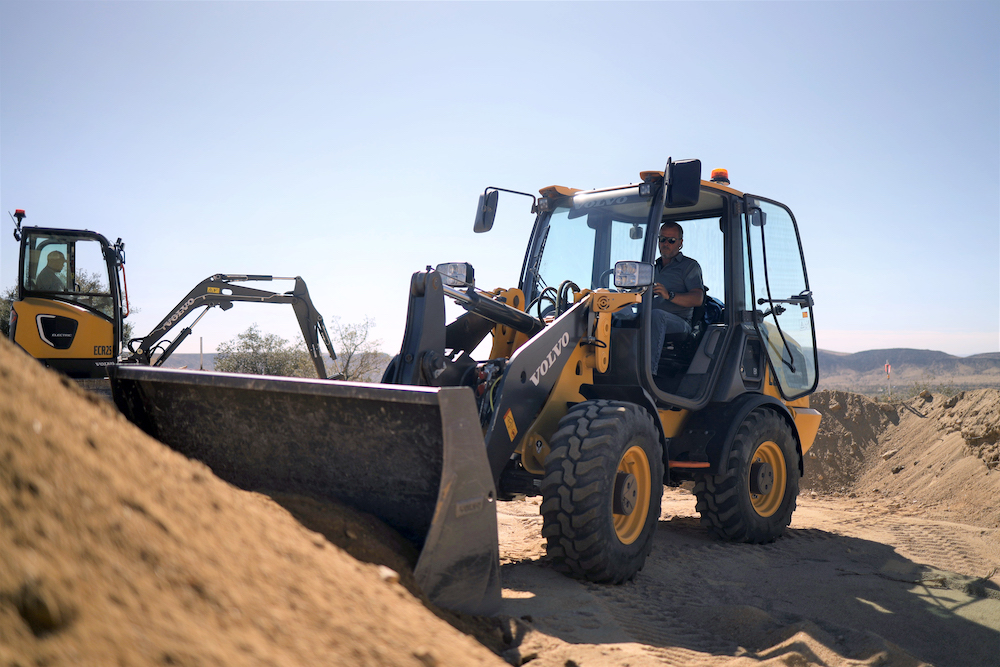
Features
Columns
Heavy Equipment
Editorial: Electric results
Volvo CE pilot project offers impressive results
November 9, 2021 By Andrew Snook
 The Volvo Construction Equipment L25 Electric compact wheel loader and ECR25 Electric compact excavator at work for Baltic Sands in the California desert during the pilot project. Photo: Volvo CE
The Volvo Construction Equipment L25 Electric compact wheel loader and ECR25 Electric compact excavator at work for Baltic Sands in the California desert during the pilot project. Photo: Volvo CE Can you feel the electricity in the air?
Volvo Construction Equipment (Volvo CE) certainly could with the recent release of its latest electric vehicle pilot project results.
In late September, Volvo CE released the results from a year-long pilot project where the company’s ECR25 electric compact excavator and L25 compact electric compact wheel loader were tested for sustainability and productivity compared to the company’s traditional compact diesel-powered equipment equivalents.
Four organizations participated in the pilot project: The California Department of Transportation (Caltrans) for trenching, grading and clearing of drainage areas; Casper Company, which specializes in demolition, concrete cutting and environmental services for utility and demolition work, including inside buildings; Baltic Sands Inc., which specializes in environmentally sensitive, off-grid property development, for excavation, grading, moving material and numerous other tasks in housing construction; and Waste Management, a waste disposal and recycling company for light waste handling.
The results were impressive.
Over 400 total operating hours, the two zero-emissions producing electric machines (powered by lithium-ion batteries) reduced carbon dioxide emissions by six metric tons and saved approximately 560 gallons of fuel when compared to the equivalent diesel-powered machines running equivalent hours.
Another benefit from the electric machines was a significant reduction in noise pollution. Volvo CE stated that the ECR25 Electric excavator lowered exterior noise levels by nine decibels (dBA) compared to its diesel counterparts (this represents 90-per-cent decrease in sound power); while the L25 Electric compact wheel loader experienced a similar reduction in sound power.
On the performance side, Volvo CE stated that “pilot project participants said that in practice the performance matched that of diesel machines.” This included several key areas, including digging depth and breakout force on the excavator and tipping load and dump height for the wheel loader.
Another positive feedback from participants was the decreased maintenance requirements due to no longer needing to perform maintenance related to oil, oil filters and diesel; as well as no longer requiring a diesel exhaust fluid (DEF) tank.
The first customer deliveries of the ECR25 Electric are expected in January 2022 with the ECR25 Electric and L25 Electric becoming available throughout North America in early 2022.
Volvo CE stated this makes them the first OEM to commercialize dedicated electric machines at the larger end of the compact size range.
“Our customers’ response to these machines validates that there is not only a desire for these types of machines in North America but a pull in many markets,” stated Stephen Roy, president of Region North America, Volvo CE. “This just adds further momentum to the Volvo vision of offering machines that align with science-based targets and our overall commitment to decarbonization.”
This isn’t the first big adventure into electrifying equipment for Volvo CE.
A few years ago, the company spent SEK 203-million (approximately $30 million) on a pilot project created by Volvo CE and Skanska Sweden in partnership with the Swedish Energy Agency and two Swedish universities to electrify certain transport stages in quarry operations from excavation to primary crushing and transport to secondary crushing though the use of autonomous and electric vehicle prototypes; new work methods; and site management systems to create a complete site solution.
I think it’s safe to say that Volvo CE sees electric operator driven and autonomous construction equipment as the future for sites across the globe.
With global warming only expected to get worse in the coming years, that’s certainly not a bad solution.
This article appears in Rock to Road’s 2021 Buyers’ Guide.
Print this page